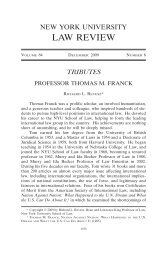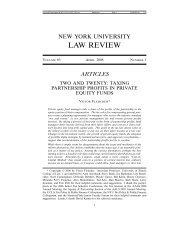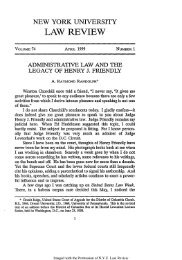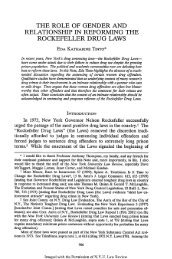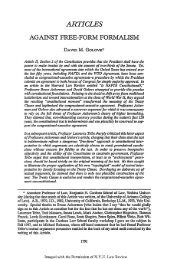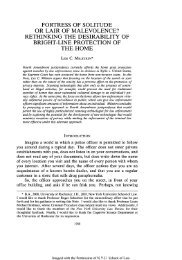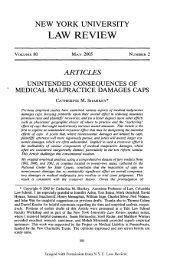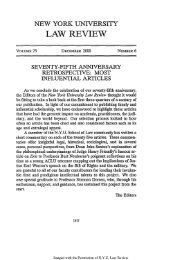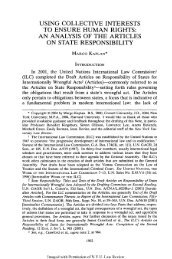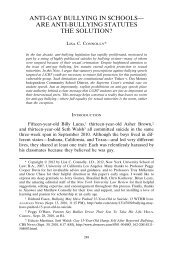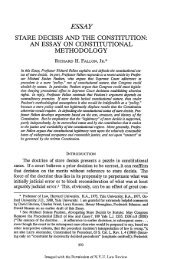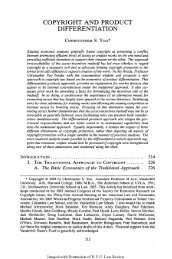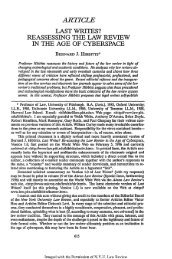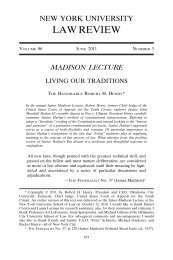Immigrants and the Right to Petition - NYU Law Review
Immigrants and the Right to Petition - NYU Law Review
Immigrants and the Right to Petition - NYU Law Review
You also want an ePaper? Increase the reach of your titles
YUMPU automatically turns print PDFs into web optimized ePapers that Google loves.
Imaged with <strong>the</strong> Permission of N.Y.U. School of <strong>Law</strong><br />
NEW YORK UNIVERSITY LAW REVIEW<br />
[Vol. 78:667<br />
matically pressured by law enforcement strategies since September<br />
11.21 Analysis of <strong>the</strong> right <strong>to</strong> petition also has important implications<br />
for a range of legal doctrines grounded in <strong>the</strong> <strong>Petition</strong> Clause, from<br />
<strong>the</strong> right of access <strong>to</strong> courts <strong>to</strong> <strong>the</strong> Noerr-Penning<strong>to</strong>n doctrine of antitrust<br />
law <strong>to</strong> no-contact rules of legal ethics. 22 Finally, consideration of<br />
<strong>the</strong> petition rights of noncitizens in particular sheds light on <strong>the</strong> contemporary<br />
meaning of membership in a national community <strong>and</strong> on<br />
<strong>the</strong> limits of <strong>the</strong> governmental power <strong>to</strong> regulate <strong>the</strong> lives of terri<strong>to</strong>rially<br />
resident noncitizens.<br />
Part I of this Article reviews <strong>the</strong> available empirical data on immigrant<br />
victimization <strong>and</strong> reporting rates regarding illegal activity,<br />
both criminal <strong>and</strong> civil. Part II addresses <strong>the</strong> Supreme Court's 1990<br />
conclusion, based on a cursory his<strong>to</strong>rical analysis, that many immigrants,<br />
especially undocumented immigrants, are excluded from "<strong>the</strong><br />
people" whose rights <strong>the</strong> Framers intended <strong>to</strong> secure by <strong>the</strong> First<br />
Amendment. 23 To challenge <strong>the</strong> Court's conclusion on its own his<strong>to</strong>rical<br />
terms, I examine <strong>the</strong> his<strong>to</strong>ry of petitioning by noncitizens in <strong>the</strong><br />
Founding era, from petitions by Acadian <strong>and</strong> Domingan refugees <strong>to</strong><br />
those of Native American <strong>and</strong> foreign veterans of <strong>the</strong> Revolutionary<br />
War. A few of <strong>the</strong>se narratives are presented here in a refutation of<br />
<strong>the</strong> Supreme Court's conclusion that <strong>the</strong> Framers intended <strong>to</strong> exclude<br />
immigrants from protections afforded "<strong>the</strong> people" in <strong>the</strong> Bill of<br />
<strong>Right</strong>s. In Part III, I develop a <strong>the</strong>ory of petitioning as "extraordinary<br />
speech," contending that text, his<strong>to</strong>ry, purpose, <strong>and</strong> reason support<br />
subjecting petitioning restrictions <strong>to</strong> close judicial scrutiny. Such an<br />
approach would cohere with <strong>the</strong> principles animating doctrines related<br />
<strong>to</strong> petitioning jurisprudence, including free speech, court access,<br />
unconstitutional conditions, <strong>and</strong> equal protection. Applying this <strong>the</strong>ory<br />
<strong>to</strong> contemporary law enforcement agency policies, I conclude that<br />
some policies so burden <strong>the</strong> petition rights of immigrants as <strong>to</strong> violate<br />
<strong>the</strong> First Amendment. 2 4 Finally, Part IV attempts <strong>to</strong> anticipate <strong>and</strong><br />
dispel principal objections <strong>to</strong> a <strong>the</strong>ory of robust petition rights for<br />
21 See infra notes 75-82 <strong>and</strong> accompanying text.<br />
22 See infra notes 289-98 <strong>and</strong> accompanying text.<br />
23 United States v. Verdugo-Urquidez, 494 U.S. 259, 265 (1990) ("While this textual<br />
exegesis is by no means conclusive, it suggests that '<strong>the</strong> people' protected by <strong>the</strong> ... First<br />
... Amendment[ I... refers <strong>to</strong> a class of persons who are part of a national community or<br />
who have o<strong>the</strong>rwise developed sufficient connection with this country <strong>to</strong> be considered<br />
part of that community.").<br />
24 1 do not argue that immigrants who petition are <strong>the</strong>reby entitled <strong>to</strong> an affirmative<br />
grant of lawful immigration status. My conclusion is narrower: <strong>Immigrants</strong> who exercise<br />
<strong>the</strong>ir constitutional right <strong>to</strong> communicate a grievance <strong>to</strong> <strong>the</strong> government may not <strong>the</strong>refore<br />
be deported. An undocumented immigrant who reports a crime or o<strong>the</strong>rwise petitions <strong>the</strong><br />
government is of course subject <strong>to</strong> removal if <strong>the</strong> INS discovers her independently of her<br />
petitioning activity.



